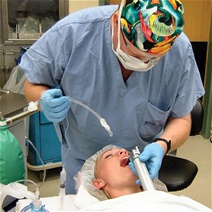CRNA is the acronym for Certified Registered Nurse Anesthetist. A Certified Registered Nurse Anesthetist (CRNA) is responsible for the administration of anesthetics to patients and monitors the anesthetized patient throughout the medical procedure. In the US, nurse anesthetists have provided anesthesia care to patients for nearly 150 years. Today, about 44,000 nurse anesthetists practice throughout all fifty states.

CRNA Job Description
Nurse Anesthetists work with a high degree of autonomy in performing the functions involved in providing anesthesia care. The CRNA is responsible for ensuring safe patients receive the right amount of anesthesia during and after their medical procedure. CRNAs assume responsibility for the level of pain a patient experiences – too little or too much anesthesia can make surgery painful.
CRNAs receive extensive training in preparation for their role in the healthcare team. The fundamental roles and responsibilities of a CRNA are:
- Performing a pre-operative physical examination, taking a medical history, and counseling patients prior to surgery
- Preparing drugs, equipment, and the operating room for surgical procedures
- Administering anesthetic drugs and the post-operative recovery period
- Performing medical non-surgical procedures, i.e. IV insertion, intubation, and airway management
- Recognizing and treating surgical complications, including life-threatening situations
- Assisting surgeons, anesthesiologists, and other medical professionals.
CRNAs work in both private and outpatient medical clinics. According to the American Nurses Association, over 65% of all anesthetics administered to patients in the US is delivered by CRNAs.
CRNAs assume great responsibility for their patients, so the work can be stressful as well as rewarding. Work schedules vary, but it is not uncommon for CRNAs to be on-call several days a week. Such scheduling can affect your quality of life.
CRNA Personality Traits
Not everyone possesses the personality traits needed to work successfully as a CRNA. While many personality types enter the CRNA profession, certain common traits are shared by successful individuals.
Like any nurse, you must have a desire to help people. You should be patient, compassionate, accurate, and responsible.
The CRNA profession requires a “Type A” personality that is willing to work diligently and willing to continue their education after graduation to keep pace with changes in the field of anesthesia.
You must have strong communication skills to be a CRNA. As a CRNA, you interact with patients and medical personnel on a daily basis. You can be an introvert, but you must be able to develop a good rapport with people. Some patients will need you to alleviate their concerns about being under anesthesia. Good writing skills are also critical, particularly the ability to write content appropriate for your audience.
CRNAs need good critical thinking because emergency situations are inherent to working in the field. The ability to exercise sound judgment in emergency situations is critical for positive patient outcomes.
Becoming a CRNA
To enter a CRNA program, you must be a registered nurse with either a bachelor’s of science in nursing or a relevant baccalaureate degree. Competition for admission is keen so high grades are important. At least one year of experience in an acute care setting as a registered nurse is required for admission to most programs. Nurse anesthetist programs are at the graduate level yielding master’s or doctoral degrees. The programs entail 2-3 years of rigorous coursework and focused on the program.
Graduates must pass a national certification examination administered by the Council on Certification of Nurse Anesthetists to become a CRNA. You will be well prepared for this exam, and the national first-time pass rate for the exam is greater than 90%.
Becoming a nurse anesthetist also requires a substantial financial investment. The tuition cost of an entire nurse anesthesia graduate program can be as much as $120,000. Nurse anesthesia students graduate with an average $100,000-200,000 in student debt.

Continuing Education
Being a CRNA requires dedication to lifelong learning. CRNAs must complete 40 hours of continuing medical education credits every two years to maintain certification. In addition, recertification by the Council on Certification of Nurse Anesthetists requires submission of proof of practice of anesthesia and the absence of problems which would be adverse to the nurse anesthesia practice.